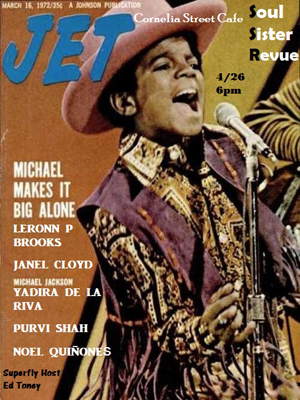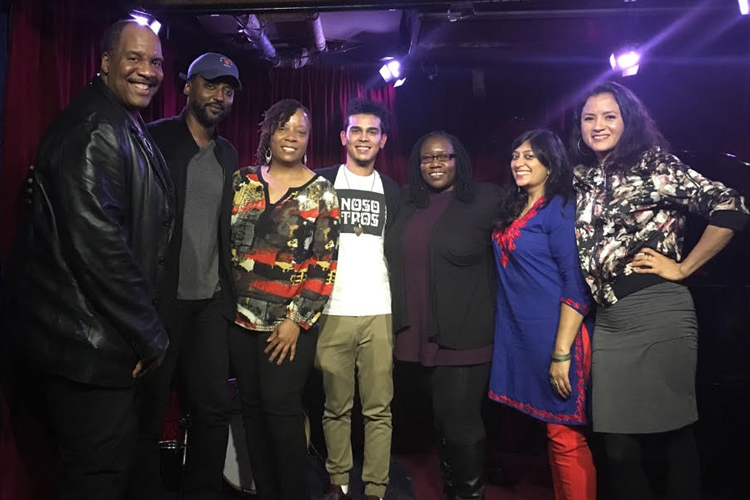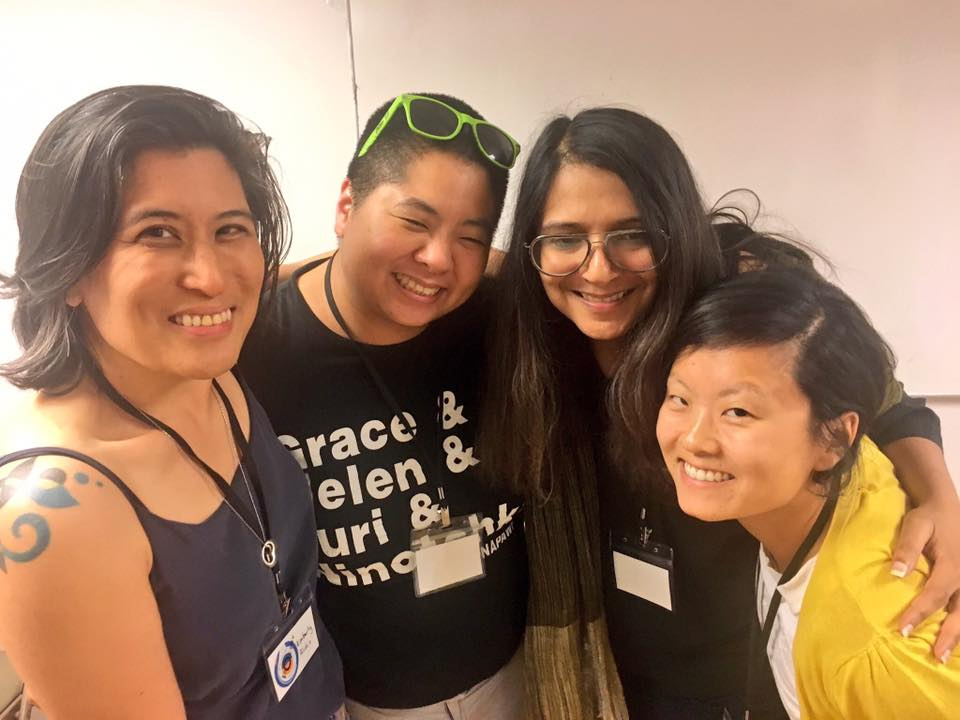KFC’s Romance Novel, Pearson Announces More Cuts, and More
American Writers Museum to open next week; Bill Clinton and James Patterson pen a political thriller; the country homes of the Bloomsbury Group; and other news.
Jump to navigation Skip to content
American Writers Museum to open next week; Bill Clinton and James Patterson pen a political thriller; the country homes of the Bloomsbury Group; and other news.
“I was young when you came to me. / Each thing rings its turn…” begins Meena Alexander’s poem “Muse.” Write a poem of direct address to a muse—any specific object, memory, person, moment, or idea that invokes wonder and reflection. Read the rest of Alexander’s poem for inspiration derived from sensory pleasures, multiple languages, and the associations between words and images.
Cynthia Manick is the author of Blue Hallelujahs (Black Lawrence Press, 2016). A Pushcart Prize nominee with an MFA in creative writing from the New School, she has received fellowships from Cave Canem, the Callaloo Creative Writing Workshop, Hedgebrook, Poets House, and the Vermont Studio Center. She serves as East Coast Editor of Jamii Publishing and is founder and curator of the reading series Soul Sister Revue. Her work has appeared in the Academy of American Poets’ Poem-a-Day series, African American Review, Bone Bouquet, Callaloo, Muzzle Magazine, Tidal Basin, the Wall Street Journal, and elsewhere. She currently resides in Brooklyn.
 At the end of 2013, I wanted a change. I had been going to traditional poetry readings for years and they all felt the same—the same writers and their friends, people with an MFA reading with similar graduates, or people with published books. And more troubling, I didn’t see people who looked like me, on stage or in the audience. People of color were hard to find and when I did find them, there was usually only one on stage with a couple of their friends in the audience for support. Fortunately, I’ve never been the kind of person to wait for things to happen, so I created Soul Sister Revue.
At the end of 2013, I wanted a change. I had been going to traditional poetry readings for years and they all felt the same—the same writers and their friends, people with an MFA reading with similar graduates, or people with published books. And more troubling, I didn’t see people who looked like me, on stage or in the audience. People of color were hard to find and when I did find them, there was usually only one on stage with a couple of their friends in the audience for support. Fortunately, I’ve never been the kind of person to wait for things to happen, so I created Soul Sister Revue.
Revue is such a strange name, but it reminded me of vaudeville acts, Motown singers performing together, and theatrical sketches of the 1960s and 1970s that told a story. Soul music and poetry go hand in hand, and when you add the African American oral tradition of storytelling, a revue takes place. People put down their phones, and focus on readers of all ages, gender, and race, as they tell their story through poetry. The first reading took place in April 2014 with Hettie Jones (author of Drive and How I Became Hettie Jones), Evie Shockley (author of a half-red sea and the new black), JP Howard, and me, with T’ai Freedom Ford as host. I had positive experiences with poetry residencies and workshops, so I asked people I admired and they responded. I also set a precedent of established writers (Hettie and Evie) reading on stage with emerging writers (JP and I). To gain interest and connect the Revue to music, I advertised using remastered covers of Jet, Blues and Soul, and Ebony; a practice that still continues.
Old-fashioned revues came and went like rent parties or pop-up shows, so Soul Sister follows that trend by performing four times a year, one show per season. Each show asks, “What is soul?” Recent audience member Terrance Hayes (author of Lighthead and How to Be Drawn) yelled out, “James Brown!” Others answered, “a feeling,” “music in the veins,” and “connection to the universe.” The answers lay in all of that and in poetry. Soul Sister has read at the NYC Poetry Festival, the HiFi Bar, and with the help of a Poets & Writers’ grant, it goes back to Cornelia Street Cafè every year.
 Readers have included Pulitzer Prize–winning poet Gregory Pardlo, Cathy Linh Che, R. Erica Doyle, Ebony Noelle Golden, Charlene McClure, Hanif Willis-Abdurraqib, Elana Bell, and Kamilah Aisha Moon. Some poets e-mail poems to soulsisterrevue@gmail.com and others I find through readings across the city, small online journals, poet recommendations, and if I see an audience member that connects to the work, I’ll put them on the list. At the end of the night, I tell the audience that their story has yet to be written, so go out and write a poem. I like to believe that the soul helps them listen.
Readers have included Pulitzer Prize–winning poet Gregory Pardlo, Cathy Linh Che, R. Erica Doyle, Ebony Noelle Golden, Charlene McClure, Hanif Willis-Abdurraqib, Elana Bell, and Kamilah Aisha Moon. Some poets e-mail poems to soulsisterrevue@gmail.com and others I find through readings across the city, small online journals, poet recommendations, and if I see an audience member that connects to the work, I’ll put them on the list. At the end of the night, I tell the audience that their story has yet to be written, so go out and write a poem. I like to believe that the soul helps them listen.
Support for the Readings & Workshops Program in New York City is provided, in part, by public funds from the New York State Council on the Arts, and the New York City Department of Cultural Affairs, with additional support from the Louis and Anne Abrons Foundation, the Axe-Houghton Foundation, the A.K. Starr Charitable Trust, and Friends of Poets & Writers.
Photo: (left to right) Ed Toney, LeRonn Brooks, Janel Cloyd, Noel Quiñones, Cynthia Manick, Purvi Shah, and Yadira De La Riva at the Fourth Anniversary Show (Credit: Cynthia Manick).Librarians meet on Capitol Hill to fight for funding; children’s book author and illustrator Peter Spier has died; David Grann on writing history and confronting the unknown; and other news.
Allen Ginsberg’s anti-war poem “Hum Bom!” is read by Bono and then discussed by U.S. Poet Laureate Juan Felipe Herrera and Harvard professor Elisa New. New is the creator of Poetry in America, a multi-platform digital initiative that offers professional development classes for educational practitioners, as well as free online poetry courses.
In this video, writers and book lovers—including Rumaan Alam, Ann Patchett, Jacqueline Woodson, Neil Gaiman, Mira Jacob, Benjamin Percy, and Peter Straub—help celebrate Independent Bookstore Day and the opening of Books Are Magic. The new bookstore is run by novelist Emma Straub and her husband Michael Fusco-Straub in Brooklyn.
Jim Shepard wins $30,000 Rea Award; a protest poetry survival kit for women; study measures poetry-induced chills; and other news.
Tiana Nobile is a Kundiman Fellow and lives in New Orleans. Her poetry has appeared in the Collagist, Phantom, Bone Bouquet, TENDE RLOIN, and others. Her chapbook, The Spirit in the Staircase, a collaboration with visual artist Brigid Conroy, is forthcoming in spring 2017.
 The history and reality of being Asian American in the South are often rendered invisible when it comes to mainstream discourse. Four Kundiman fellows worked to challenge this erasure by uplifting the voices of Asian American poets in the South through the panel, “Self-Articulation and Solidarity: Asian American Poets Encounter the South,” a hybrid poetry reading and discussion at the New Orleans Poetry Festival on April 21.
The history and reality of being Asian American in the South are often rendered invisible when it comes to mainstream discourse. Four Kundiman fellows worked to challenge this erasure by uplifting the voices of Asian American poets in the South through the panel, “Self-Articulation and Solidarity: Asian American Poets Encounter the South,” a hybrid poetry reading and discussion at the New Orleans Poetry Festival on April 21.
Within the vast terrain that constitutes the South, we all hail from distinct locations—Ching-In Chen from Houston, Kimberly Alidio from Austin, Vidhu Aggarwal from Orlando, and I’m from New Orleans—and our experiences and histories within these places vary greatly. This panel was not an attempt to seek or define a singular narrative; rather, we discussed the diversity of experience and our personal relationships with the South, whether that be as newcomers, natives, or transplants. While our various participations range, they include actively acknowledging and illuminating the deep, complex histories of Asian American existence in southern communities as teachers and standing in solidarity with the Black Lives Matter movement as activists through Asians 4 Black Lives. During the panel we shared poems and engaged in a critical dialogue in order to call attention to the fact that yes, we are here, we have been here, and we aren’t going anywhere.
Below, the panelists share their thoughts on the experience.
“Our panel was a map across Texas, Louisiana, Florida, and Maryland. It stitched many Asian American Souths: rural and urban, spectacular and invisible. It is intimate and curious. How we commute between communities in a politically diverse South. How we return again and again to crisis encounters in responses to street harassers and scammers profiting from gentrification schemes. How childhoods in the South birth postcolonial futures. How technologies can translate and transmit the migrant condition. Our panel pushed against various narrows and traps. We don’t claim space for permanent, historical settlements atop indigenous land. We refuse to compete with Black communities for civic attention and resources in the South. This is difficult and collaborative work. Thanks to Poets & Writers for making this glimpse of possibility possible.”
—Kimberly Alidio, author of After projects the resound (Black Radish, 2016)
“For Ching-In and I, the New Orleans Poetry Festival was the third iteration of the ‘Self-Articulation’ panel. For me it felt different speaking in New Orleans, where I grew up, learned to ride a bike, worked in street fairs, and where Tiana Nobile has lived for the last ten years. Kimberley Alido read/spoke brilliantly of the Texas landscape. Tiana read from her manuscript The Spirit in the Staircase, ‘l’esprit d’escalier,’ the French term for the perfect comeback, arriving woefully too late, after the fact. We’ve all had our share of jibes, insults on the street, and the impossibility of ready answers. Ching-In asked me about comebacks I might have up my sleeve, and I blanked. A comeback to what? My instinct was to invite folks in the room to hurl insults at me, so I could test my wits in real time! But I couldn’t even do that. I was too slow! The conversation moved on: to the freeze response. Or whether or not our works were a type of response. But would that always put our work/ourselves in a defensive/offensive posture? In argument? We could have talked more, and did over drinks and crawfish at Tiana’s. It was okay to be slow, to take our time, to meet up again and again and figure it out.”
—Vidhu Aggarwal, author of The Trouble With Humpadori (The (Great) Indian Poetry Collective, 2016)
“It’s rare to be seen and allowed space to reflect upon where you live, where you spend time, what you are burning to say and ask. While living in the South, I have felt between spaces, between binaries, between stories. One of the challenges about making sense of our experiences living in the South is that they are so varied and feel singular. Though our experiences living/working in Baltimore; Austin, Houston, and Huntsville in Texas; Orlando, Florida; and New Orleans were varied, to talk, eat, laugh, and poem with other Kundiman South poets at the New Orleans Poetry Festival was to recognize and make sense of each other, to put story to our questions, dialogues, and encounters, to practice generosity with each other and with those we live in community.”
—Ching-In Chen, author of recombinant (Kelsey Street Press, 2017)
Support for Readings & Workshops in New Orleans is provided by an endowment established with generous contributions from the Poets & Writers Board of Directors and others. Additional support comes from the Friends of Poets & Writers.
Photo: Kimberly Alidio, Ching-In Chen, Vidhu Aggarwal, and Tiana Nobile (Credit: Cathy Linh Che).Lisa Ko on writing and rewriting her debut novel; Tor Books launches experimental genre imprint; poet Jack Muller has died; and other news.
Writer and editor Jean Stein has died; more than 41 percent of U.K. readers lie about what they’ve read; Elizabeth Strout on embracing childhood feelings; and other news.